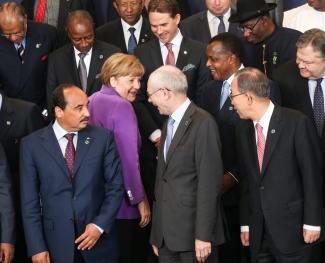European policy
Unfinished business

That assessment was accurate, in the eyes of experts from the European Centre for Development Policy Management (ECDPM), a Dutch think tank, as too little has been done to make good intentions come true.
The ECDPM notes serious institutional obstacles. The African Union’s new chairperson is Zimbabwe’s authoritarian President Robert Mugabe. He will set the tone for EU-AU cooperation. The new European Commission, moreover, has only recently taken office under Jean-Claude Juncker, who has started to reorganise the way the Commission works (see article by Furness and Koch).
Moreover, the ECDPM authors state that the JAES is overly bureaucratic: “Dialogue has generally taken place outside the JAES architecture”. They argue that more is needed than formal gatherings.
According to Juncker, strengthening the EU’s partnership with Africa is a priority, and doing so cuts across several portfolios, including international cooperation and development, trade, migration, humanitarian aid and Europe’s neighbourhood policy. Within the Commission, Vice President Federica Mogherini will coordinate the commissioners in charge of trade (Cecilia Malmström), neighbourhood (Johannes Hahn), humanitarian aid and crisis management (Christos Stylianides) and international cooperation and development (Neven Mimica). The ECDPM considers the approach of vice presidents leading teams of commissioners useful, but also observes that despite Juncker’s rhetoric, EU-Africa relations are currently not high on the agenda.
Migration is an issue that worries African and European leaders alike. The EU-Africa Summit passed a joint declaration on migration and mobility, but, as the authors bemoan, it did not lead to any tangible results. EU members have different policies concerning this issue. It is up to Dimitris Avramopoulos, the commissioner for migration, home affairs and citizenship, to make EU member governments overhaul the common asylum policy, which the ECDPM considers “out-dated”. Avramopoulos, is not a permanent member of Mogherini’s team of commissioners, but he can be “pulled in as required”, the authors write.
They also discuss the problem of aid fragmentation. Once again, all EU members pursue their own policies. The EU Delegations, which are basically embassies of the European Commission in non-member countries, are supposed to coordinate and complement the developmental efforts of the member countries, but there is a need for greater synergies, according to the ECDPM.
The ECDPM appreciates the joint programming by the Commission and member countries have agreed in development matters for the years 2014 to 2020 since this approach should reduce fragmentation. However, they question whether EU institutions like the EEAS (the European External Action Service), DG DEVCO (the Directorate-General for International Cooperation and Development) and the EU Delegations have the capacities to sustain this approach in the long run.
The authors warn that volatile situations in Africa and elsewhere are likely to require fast responses. The crises in Ukraine or Syria/Iraq might distract from reforming the agencies involved in development matters, the scholars fear. Leaders at the 2014 EU-Africa Summit reaffirmed that peace and security are priorities too. The ECDPM authors insist, that any European security strategy must take development into account since “there can be no security without development and there can be no development without security”.
Theresa Krinninger
Link:
ECDPM Study “Challenges for Africa-EU Relations in 2015”:
http://ecdpm.org/publications/challenges-eu-africa-mdg-post-2015/?utm_source=hp&utm_medium=hp&utm_campaign=ntr














